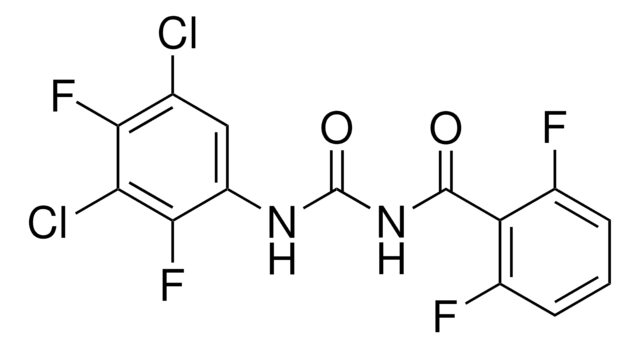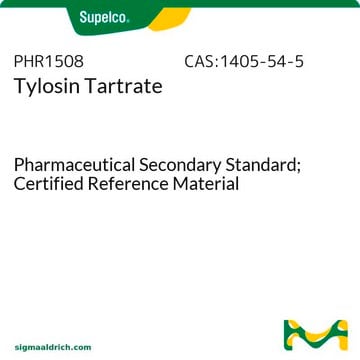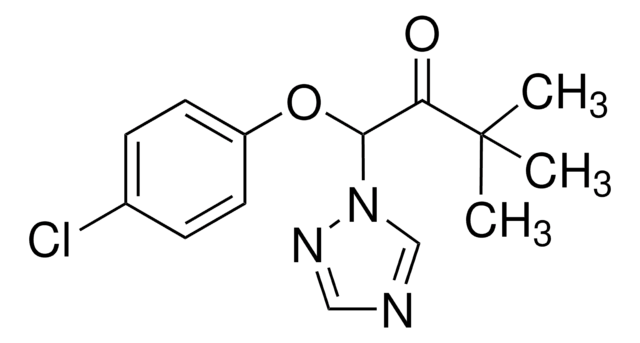CRM01399
Teflubenzuron
certified reference material, TraceCERT®, Manufactured by: Sigma-Aldrich Production GmbH, Switzerland
Synonym(s):
Clofentezine
About This Item
Recommended Products
grade
certified reference material
TraceCERT®
Quality Level
product line
TraceCERT®
shelf life
limited shelf life, expiry date on the label
manufacturer/tradename
Manufactured by: Sigma-Aldrich Production GmbH, Switzerland
storage temp.
2-8°C
SMILES string
Fc1cccc(F)c1C(=O)NC(=O)Nc2cc(Cl)c(F)c(Cl)c2F
InChI
1S/C14H6Cl2F4N2O2/c15-5-4-8(12(20)10(16)11(5)19)21-14(24)22-13(23)9-6(17)2-1-3-7(9)18/h1-4H,(H2,21,22,23,24)
InChI key
CJDWRQLODFKPEL-UHFFFAOYSA-N
General description
Certified content by quantitative NMR incl. uncertainty and expiry date are given on the certificate.
Download your certificate at: http://www.sigma-aldrich.com
Teflubenzuron is a type of benzoylurea insecticide that disrupts the chitin deposition in the insect cuticle by inhibiting chitin synthesis and molting. It is a systemic insect growth regulator used for the control of lepidoptera, coleoptera, diptera, aleyrodidae, hymenoptera, psyllidae, and hemiptera larvae in vines, pome fruit, stone fruit, citrus, cabbages, potatoes, vegetables, soybeans, trees, sorghum, tobacco, and cotton. It is also used to control fly and mosquito larvae and immature stages of locusts.
Teflubenzuron was included to the Annex I of Directive 91/414/EEC on 01 December 2009. Teflubenzuron is not approved for use in the European Union (EU). But the Annexe IIIA of Regulation (EC) No 396/2005 establishes the maximum residue levels (MRLs) of teflubenzuron in the range of 0.01–5 mg/kg in fruits, vegetables, crops, and livestock. Teflubenzuron is monitored in the Multiannual Control Programmes for Pesticides Residues (MACP), run within the EU and EFTA in/on products of plant origin.
Application
The teflubenzuron certified reference material (CRM) may also find use as given below:
- Determination of 9 benzoylurea insecticides in fruit, vegetable, cereal, and animal product samples by pressurized liquid extraction and LC-MS/MS
- Simultaneous analysis of lufenuron, bifenthrin, and teflubenzuron residues in coconut water by matrix solid-phase dispersion extraction combined with reversed-phase high-performance liquid chromatography
- Development of a high performance liquid chromatography–triple quadrupole mass spectrometry (HPLC-MS/MS) based method for the simultaneous estimation of 7 benzoylurea insecticides in infused oolong tea
- Multi-residue analysis of pesticides in Açai fruit by an extraction based on matrix solid phase dispersion and determination using liquid chromatography
- Comparative study for the extraction of 9 benzoylurea insecticides using two dispersive liquid-liquid microextraction (DLLME) approaches from wastewater samples followed by their determination using liquid chromatography-quadrupole-linear ion trap-mass spectrometry
Recommended products
Legal Information
Signal Word
Warning
Hazard Statements
Precautionary Statements
Hazard Classifications
Aquatic Acute 1 - Aquatic Chronic 1 - STOT RE 2
Target Organs
Liver
Storage Class Code
11 - Combustible Solids
WGK
WGK 3
Flash Point(F)
Not applicable
Flash Point(C)
Not applicable
Choose from one of the most recent versions:
Certificates of Analysis (COA)
Don't see the Right Version?
If you require a particular version, you can look up a specific certificate by the Lot or Batch number.
Already Own This Product?
Find documentation for the products that you have recently purchased in the Document Library.
Our team of scientists has experience in all areas of research including Life Science, Material Science, Chemical Synthesis, Chromatography, Analytical and many others.
Contact Technical Service










